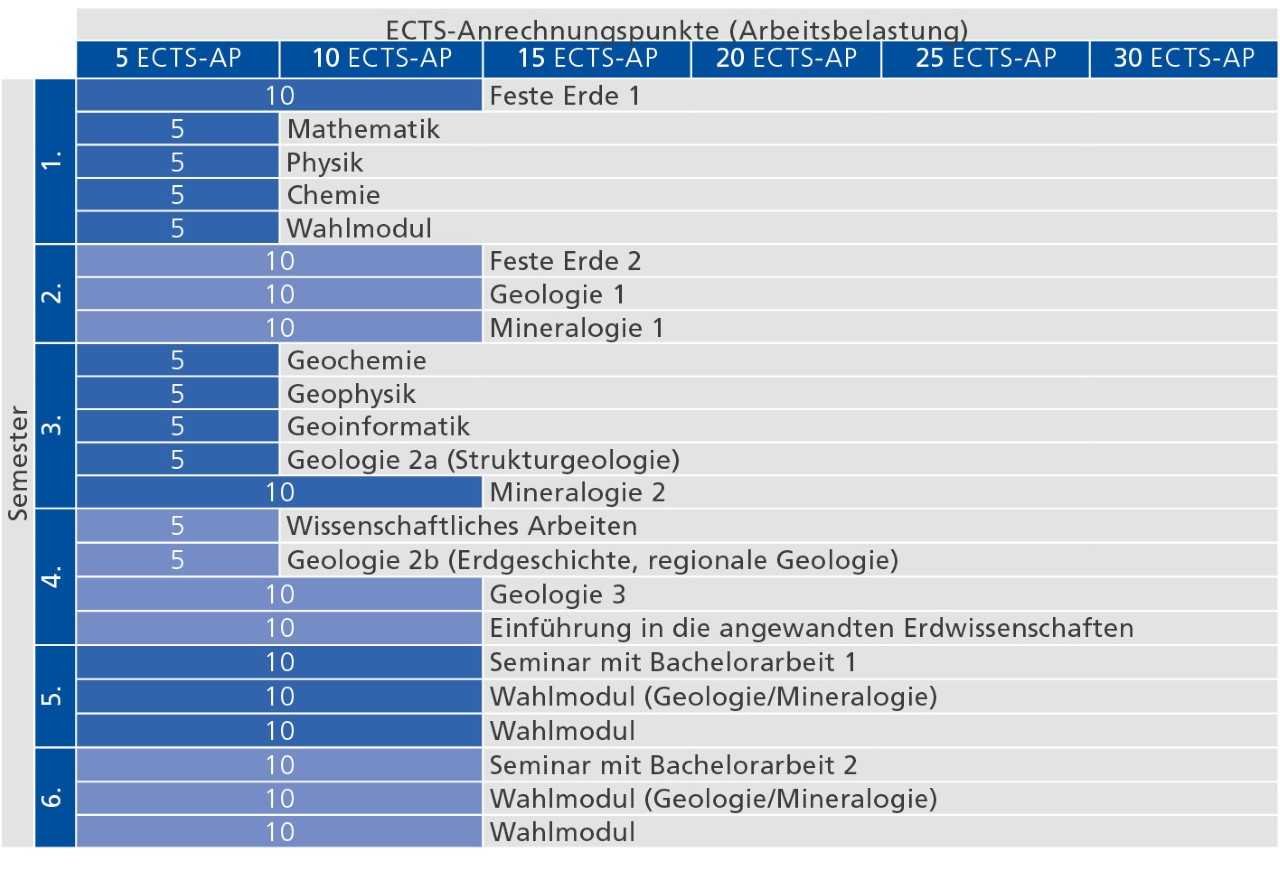Bachelorstudium Erdwissenschaften
Curriculum (2018W)
Bachelor of Science
Dauer/ECTS-AP
6 Semester/180 ECTS-AP
Studienart
Vollzeit
Unterrichtssprache
Deutsch
Voraussetzung
Matura/Äquivalentes Zeugnis und Sprachnachweis
Fakultät
Fakultät für Geo- und Atmosphärenwissenschaften
Niveau der Qualifikation
Bachelor (1. Studienzyklus)
ISCED-11: Stufe 6, EQR/NQR: Stufe 6
ISCED-F
0532 Geowissenschaften
Studienkennzahl
UC 033 615
Zusatzprüfung
Biologie und Umweltkunde
Das Curriculum ist die Grundlage eines Studiums und vermittelt einen detaillierten Überblick zum Aufbau, zum Inhalt, zur Prüfungsordnung und zum Qualifikationsprofil.
Mittels Curriculum können mehrere wichtige Fragen bereits vor Studienbeginn geklärt werden: welche Zulassungsvoraussetzungen gelten für das Bachelorstudium Erdwissenschaften, wie lange dauert das Studium, welche Module müssen absolviert werden etc.
Für das Bachelorstudium Erdwissenschaften gilt aktuell das Curriculum 2018W.
Informationen zum Curriculum (2018W)
Die Gesamtfassung des Curriculums spiegelt das aktuell gültige Curriculum wider, ist rechtlich unverbindlich und dient lediglich der Information. Die rechtlich verbindliche Form des Curriculums inkl. etwaiger Änderungen finden Sie in den entsprechenden Mitteilungsblättern.
Die Information, welche Curriculumsversion für Sie gilt, entnehmen Sie bitte Ihrem Studienblatt
abrufbar unter: https://lfuonline.uibk.ac.at/public/lfuonline_meinestudien.studienblatt
Spalte: Curriculum in der geltenden Fassung
Zusatzprüfung
Die Zusatzprüfung aus Biologie und Umweltkunde entfällt,
- wenn Naturwissenschaften, Biologie oder Biologie in Verbindung mit anderen Unterrichtsbereichen nach der 8. Schulstufe an einer höheren Schule im Ausmaß von mindestens vier Wochenstunden erfolgreich besucht hat.
- wenn Kenntnisse aus den Bereichen Naturwissenschaften, Biologie oder Biologie in Verbindung mit anderen Unterrichtsbereichen Studienwerber/innen bereits im Aufnahmeverfahren vor Zulassung enthalten sind (betrifft alle Aufnahmeverfahren gem. § 65a und §§71b, c, d UG 2002).
Studieneingangs- und Orientierungsphase (STEOP)
(1) Im Rahmen der Studieneingangs- und Orientierungsphase, die im ersten Semester stattfindet, sind folgende Lehrveranstaltungsprüfungen abzulegen:
- VO System Erde 1 (PM 1 lit. a/2 SST/4 ECTS-AP)
- VO System Erde 2 (PM 1 lit. b/2 SST/4 ECTS-AP)
(2) Der positive Erfolg bei allen Prüfungen der Studieneingangs- und Orientierungsphase berechtigt zur Absolvierung der weiteren Lehrveranstaltungen und Prüfungen.
(3) Vor der vollständigen Absolvierung der Studieneingangs- und Orientierungsphase können Lehrveranstaltungen im Ausmaß von bis zu 22 ECTS-AP absolviert werden. Im Curriculum festgelegte Anmeldungsvoraussetzungen sind einzuhalten.
Empfohlener Studienverlauf
Der unten angeführte, exemplarische Studienverlauf gilt als Empfehlung für Vollzeitstudierende, die das Studium im Wintersemester beginnen. Die Aufstellung dient der Darstellung eines möglichen Studienablaufs und ist nicht verpflichtend. Etwaige Prüfungswiederholungen bzw. deren studienzeitverzögernde Wirkung sind nicht berücksichtigt.
Die Regelstudienzeit beträgt 6 Semester bzw. 180 ECTS-AP, wobei gemäß Universitätsgesetz die Arbeitsbelastung eines Studienjahres 1.500 (Echt-)Stunden zu betragen hat und dieser Arbeitsbelastung 60 Anrechnungspunkte zugeteilt werden (ein ECTS-Anrechnungspunkt entspricht einer Arbeitsbelastung der Studierenden von 25 Stunden).
10,0 ECTS-AP: Feste Erde 1
5,0 ECTS-AP: Mathematik
5,0 ECTS-AP: Physik
5,0 ECTS-AP: Chemie
5,0 ECTS-AP: Wahlmodul
10,0 ECTS-AP: Feste Erde 2
10,0 ECTS-AP: Geologie 1
10,0 ECTS-AP: Mineralogie 1
5,0 ECTS-AP: Geochemie
5,0 ECTS-AP: Geophysik
5,0 ECTS-AP: Geoinformatik
5,0 ECTS-AP: Geologie 2a (Strukturgeologie)
10,0 ECTS-AP: Mineralogie 2
5,0 ECTS-AP: Wissenschaftliches Arbeiten
5,0 ECTS-AP: Geologie 2b (Erdgeschichte, regionale Geografie)
10,0 ECTS-AP: Geologie 3
10,0 ECTS-AP: Einführung in die angewandten Erdwissenschaften
10,0 ECTS-AP: Seminar mit Bachelorarbeit 1
10,0 ECTS-AP: Wahlmodul (Geologie/Mineralogie)
10,0 ECTS-AP: Wahlmodul
10,0 ECTS-AP: Seminar mit Bachelorarbeit 2
10,0 ECTS-AP: Wahlmodul (Geologie/Mineralogie)
10,0 ECTS-AP: Wahlmodul

| Semester | ECTS-AP | Titel |
|---|---|---|
Erweiterung des Studiums
Im Rahmen dieses Studiums kann das Erweiterungsstudium Informatik im Umfang von 60 ECTS-AP absolviert werden. Die Zulassung zur Erweiterung setzt die Zulassung zu einem oder den bereits erfolgten Abschluss eines ausgewählten Studiums voraus. Weitere Informationen sind abrufbar unter: https://www.uibk.ac.at/studium/angebot/es-informatik/
Informationen zur Prüfungsordnung inkl. Bewertung und Benotung
Prüfungsordnung
Die Prüfungsordnung ist integraler Bestandteil des Curriculums, detaillierte Informationen finden Sie unter dem Paragrafen Prüfungsordnung.
Bei der Notenverteilungsskala handelt es sich um die statistische Darstellung der Verteilung aller positiv absolvierten Prüfungen, die innerhalb eines Studiums bzw. eines Studienfaches (unter Heranziehung aller gemeldeten Studierenden eines Studiums bzw. eines Studienfaches) erfasst wurden. Die Notenverteilungsskala wird in regelmäßigen Abständen aktualisiert.
| A | B | C | D | E |
|---|---|---|---|---|
| Österreichische Notenskala | Definition | %-Satz | ||
| 1 | SEHR GUT: Hervorragende Leistung | 18,3 | = 100% | |
| 2 | GUT: Generell gut, einige Fehler | 29,6 | ||
| 3 | BEFRIEDIGEND: Ausgewogen, Zahl entscheidender Fehler | 29 | ||
| 4 | GENÜGEND: Leistung entspricht den Minimalkriterien | 23,1 | ||
| 5 | NICHT GENÜGEND: Erhebliche Verbesserungen erforderlich, Erfordernis weiterer Arbeit |
Dezember 2021
Gesamtbeurteilung der Qualifikation
Nicht zutreffend
Erklärung: Eine Gesamtbeurteilung (mit Auszeichnung bestanden, bestanden, nicht bestanden) wird nur über eine studienabschließende Prüfung, die aus mehr als einem Fach besteht, vergeben (im Curriculum dieses Studiums ist diese nicht vorgesehen).
Formulare
- Nachweis über die Bachelorarbeit gemäß Curriculum
- Prüfungsprotokoll
Hinweis: Nach positiver Absolvierung der letzten Prüfung des Bachelorstudiums sind das ausgefüllte "Prüfungsprotokoll" sowie der "Nachweis über die Bachelorarbeit gemäß Curriculum" im Prüfungsreferat einzureichen. - Ansuchen um Anerkennung von Prüfungen und Beiblatt
- Deckblatt für Bachelorarbeit
- Eidesstattliche Erklärung (der Bachelorarbeit beifügen)
- Antrag um Zulassung zur dritten und vierten Wiederholung einer Lehrveranstaltungsprüfung
- Prozedere Praxismodule
Kontakt und Information
Prüfungsreferat
Standort Innrain 52d
Studienbeauftragter (ab 01.03.2024)
Ass.-Prof. Priv.-Doz. Dr. Jasper Moernaut
Studiendekanin (ab 01.03.2024)
Priv.-Doz. Mag. Dr. Gertraud Meißl
